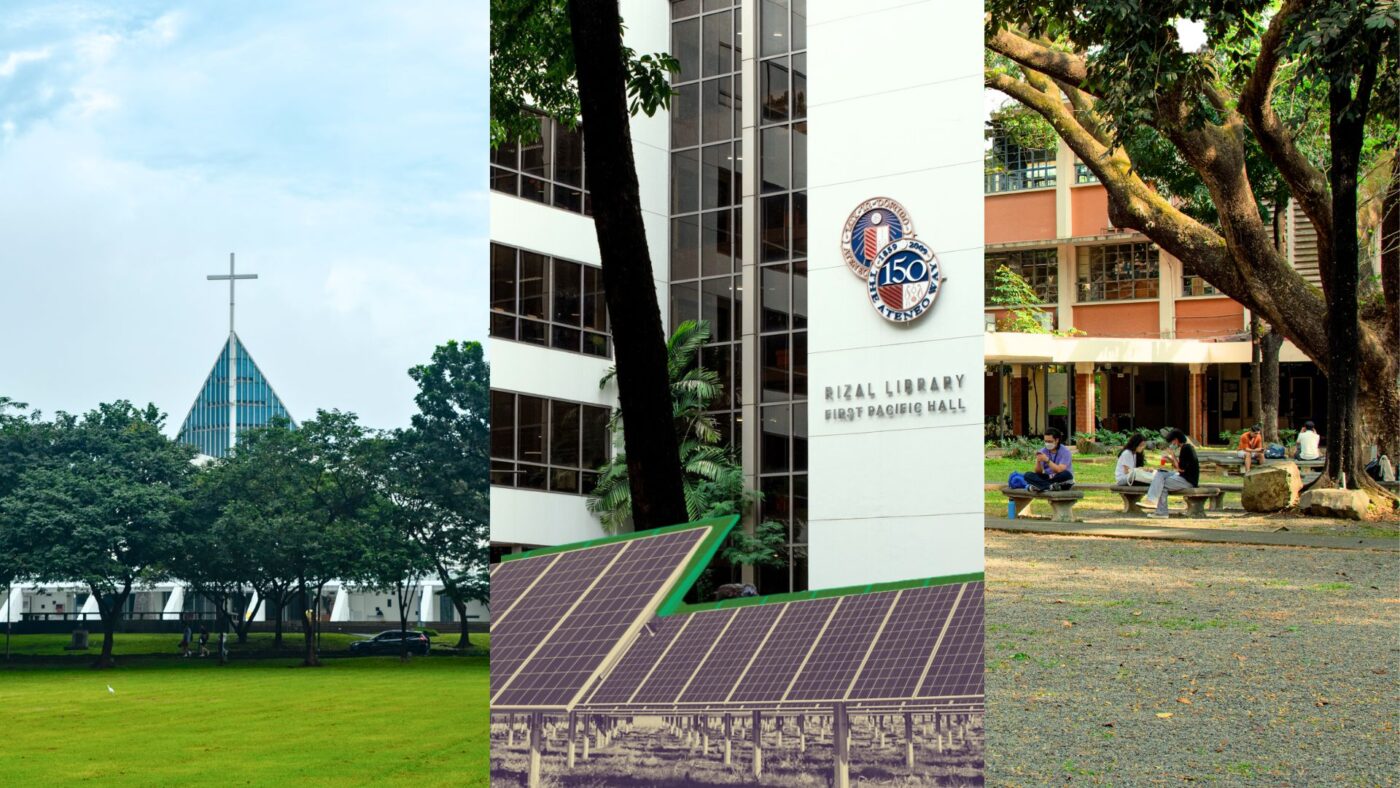IN ITS second year of committing to become a Laudato Si’ University by 2030, the Ateneo community enters the implementation phase with the launch of several initiatives. These plans, which include campus-wide initiatives and collaborative projects with student organizations, are geared toward environmental sustainability.
Inspired by Pope Francis’ 2015 encyclical, the Laudato Si’ Action Platform (LSAP) emboldens institutions to address the current ecological crisis and highlights the need for “concrete actions to protect our common home.”
Becoming a Laudato Si’ University is one of the 10 Magis Aspirations that Ateneo aims to reach by 2030 through the Lux-in-Domino Strategic Plan, which targets four major strategic priority areas—one of which is integral ecology.
Greener blue school
To become a Laudato Si’ University, one key goal that the Ateneo is set to accomplish is achieving carbon net neutrality by 2030. Aligned with this, the Central Purchasing Office released a memo calling for Solar Energy Providers for phase two of the ADMU Solar Power Project Brief.
Along with reducing the University’s overall energy consumption, the project aims to facilitate the shift to solar power by equipping several campus buildings with solar installations.
Aside from clean renewable energy, other sustainability and environmental conservation projects are also underway. These plans include the construction of a Centralized Material Recovery Facility (CMRF), which segregates and prepares recyclable materials for reprocessing, alongside the Campus Biodiversity and Climate Action Plans.
As part of the LSAP, the Campus Biodiversity Action Plan encompasses initiatives for campus care and enhancement, which opens opportunities to integrate biodiversity into teaching and research.
In addition, the Climate Action Plan outlines the University’s commitment to reducing greenhouse gas emissions and climate-related impacts on the community and its partners. Imminent projects include food system management programs.
According to Ateneo Institute of Sustainability (AIS) Director Kendra Gotangco Gonzales, MEM, PhD, their office had conducted an initial review and evaluation of the two aforementioned plans and is currently mapping their next steps.
Collective efforts
To further actualize the LSAP, Associate Vice President for Social Development, Environment, and Community Engagement (SDECE) Leland Dela Cruz, PhD emphasized the need for collaboration with external communities.
Dela Cruz cited the LSAP goal of “responding to the cry of the poor” as his office’s primary focus with a six-year plan to launch various activities in the support of partner communities. He added that these collaborations entail providing educational opportunities, initiating career training, and establishing feeding programs in underprivileged communities.
Apart from the SDECE, Dela Cruz said that these objectives would be implemented with the Ateneo Center for Educational Development (ACED), the Ateneo School of Medicine and Public Health, the Ateneo School of Government, the Gokongwei Brothers School of Education and Learning Design, Gawad Kalinga Ateneo (GK-Ateneo), and the AIS.
Additionally, the SDECE continues to inform the Sanggunian and Council of Organizations of the Ateneo – Manila (COA-M) presidents about the University’s LSAP plans.
Regarding the progress of these partnerships, he shared that the execution of these initiatives, specifically with ACED and GK-Ateneo, had been ongoing. However, due to budgetary concerns, he revealed that several implementations will be delayed for the following year.
“Our six-year plan has been laid out, it is now only a matter of following through,” he assured.
Long-term partnerships
Similarly, AIS is also doing their part in highlighting sustainability by collaborating with other offices and student organizations. Last September, they collaborated with the Loyola Schools Health Services, Fitness Improvement Team, the Sanggunian, the Ateneo Biological Organization, Health Sciences Society of the Ateneo, and The Pre-Medical Society of Ateneo for an information campaign entitled “SustainaBOx: Recipe for Food Sustainability.” This project aims to showcase sustainable food practices through infographics posted on social media.
Moving forward to sustainability, Gonzales added that AIS is also open to receiving partnerships from the community. “We don’t have a formal process in place, [but] just approach us if you have any ideas,” Gonzales said.
Moreover, Gonzales believes that the Atenean community should consistently hold itself accountable concerning sustainability and integral ecology within and beyond campus grounds.
“Rather than asking, ‘why should we practice sustainability and integral ecology when others are not?’ We should ask ourselves, ‘how can we practice sustainability and integral ecology well so others will follow?’” she asserted.
Along with this, Gonzales stressed the significance of pioneering new innovative approaches, even in the face of initial challenges, with the potential to create a lasting and positive impact.







